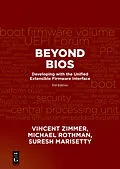This book provides an overview of modern boot firmware, including the Unified Extensible Firmware Interface (UEFI) and its associated EFI Developer Kit II (EDKII) firmware. The authors have each made significant contributions to developments in these areas. The reader will learn to use the latest developments in UEFI on modern hardware, including open source firmware and open hardware designs. The book begins with an exploration of interfaces exposed to higher-level software and operating systems, and commences to the left of the boot timeline, describing the flow of typical systems, beginning with the machine restart event.
Software engineers working with UEFI will benefit greatly from this book, while specific sections of the book address topics relevant for a general audience: system architects, pre-operating-system application developers, operating system vendors (loader, kernel), independent hardware vendors (such as for plug-in adapters), and developers of end-user applications. As a secondary audience, project technical leaders or managers may be interested in this book to get a feel for what their engineers are doing.
The reader will find:
- An overview of UEFI and underlying Platform Initialization (PI) specifications
- How to create UEFI applications and drivers
- Workflow to design the firmware solution for a modern platform
- Advanced usages of UEFI firmware for security and manageability
Autorentext
Vincent Zimmer Engineer, WA, USA, Suresh Marisetty Systems Architect, CA, USA, Michael Rothman Engineer,WA, USA
Inhalt
Acknowledgements | v
Preface | vii
Chapter 1 - Introduction | 1
Terminology | 4
Short History of EFI | 5
EFI Becomes UEFI-The UEFI Forum | 6
PIWG and USWG | 8
Platform Trust/Security | 11
Embedded Systems: The New Challenge | 12
How the Boot Process Differs between a Normal Boot and an
Optimized/Embedded Boot | 13
Summary | 14
Chapter 2 - Basic UEFI Architecture | 15
Objects Managed by UEFI-based Firmware | 15
UEFI System Table | 16
Handle Database | 16
Protocols | 18
Working with Protocols | 21
Multiple Protocol Instances | 21
Tag GUID | 21
UEFI Images | 22
Applications | 25
OS Loader | 25
Drivers | 26
Events and Task Priority Levels | 27
Summary | 30
Chapter 3 - UEFI Driver Model | 31
Why a Driver Model Prior to OS Booting? | 31
Driver Initialization | 32
Host Bus Controllers | 33
Device Drivers | 35
Bus Drivers | 36
Platform Components | 38
Hot Plug Events | 38
Pseudo Code | 41
Device Driver | 41
Bus Driver that Creates All of Its Child Handles on the First Call to
Start() | 42
Bus Driver that Is Able to Create All or One of Its Child Handles on Each Call
to Start(): | 43
Additional Innovations | 47
Security | 47
Manageability | 48
Networking | 49
Summary | 52
Chapter 4 - Protocols You Should Know | 53
EFI OS Loaders | 55
Device Path and Image Information of the OS Loader | 56
Accessing Files in the Device Path of the OS Loader | 57
Finding the OS Partition | 58
Getting the Current System Configuration | 60
Getting the Current Memory Map | 61
Getting Environment Variables | 62
Transitioning to an OS Kernel | 63
Summary | 63
Chapter 5 - UEFI Runtime | 65
Isn't There Only One Kind of Memory? | 66
How Are Runtime Services Exposed? | 69
Time Services | 70
Why Abstract Time? | 70
Get Time | 70
Set Time | 71
Get Wakeup Time | 72
Set Wakeup Time | 72
Virtual Memory Services | 72
Set Virtual Address Map | 73
ConvertPointer | 73
Variable Services | 74
GetVariable | 74
GetNextVariableName | 75
SetVariable | 75
Miscellaneous Services | 77
Reset System | 78
Get Next High Monotonic Count | 79
UpdateCapsule | 79
QueryCapsuleCapabilities | 80
Summary | 80
Chapter 6 - UEFI Console Services | 81
Simple Text Input Protocol | 83
Simple Text Input Ex Protocol | 86
Simple Text Output Protocol | 87
Remote Console Support | 89
Console Splitter | 92
Network Consoles | 93
Summary | 95
Chapter 7 - Different Types of Platforms | 97
Summary | 110
Chapter 8 - DXE Basics: Core, Dispatching, and Drivers | 111
DXE Core | 112
Hand-Off Block (HOB) List | 114
DXE Architectural Protocols | 115
EFI System Table | 117
EFI Boot Services Table | 118
EFI Runtime Services Table | 119
DXE Services Table | 119
Global Coherency Domain Services | 120
GCD Memory Resources | 120
GCD I/O Resources | 122
DXE Dispatcher | 123
The a priori File | 125
Dependency Grammar | 125
DXE Drivers | 126
Boot Device Selection (BDS) Phase | 127
Console Devices | 128
Boot Devices | 129
Boot Services Terminate | 129
Summary | 130
Chapter 9 - Some Common UEFI and PI Functions | 131
Architectural Protocol Examples | 132
CPU Architectural Protocol | 133
Real Time Clock Architectural Protocol | 135
Timer Architectural Protocol | 135
Reset Architectural Protocol | 136
Boot Device Selection Architectural Protocol | 137
Variable Architectural Protocol | 138
Watchdog Timer Architectural Protocol | 138
PCI Protocols | 139
PCI Host Bridge Resour…
